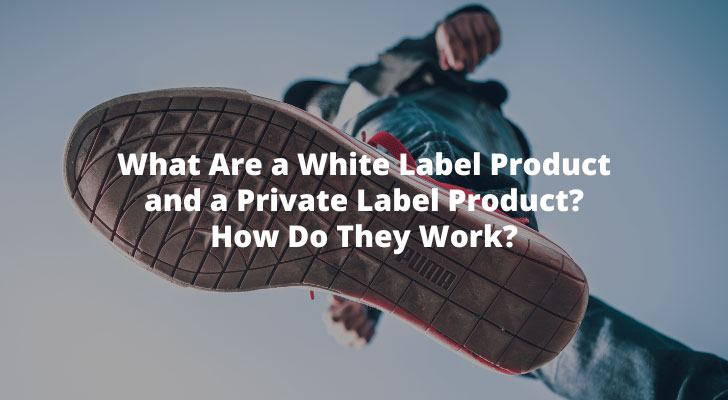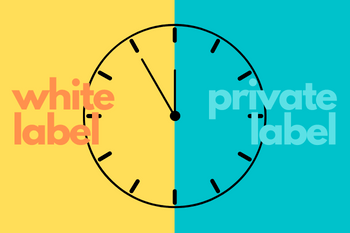White-label and private-label products are similar in that they are both manufactured by one company and sold under another company’s brand. However, there are some key differences between the two that you should be aware of before making a decision about which is right for your business. Are you ready to find out the difference between white-label and private-label products? Also, the pros and cons of each option will be discussed so that you can make an educated decision about which is best for your business.

What Is a White Label Product?
A white-label product is a generic or “blank” product that is produced by one company and then packaged and sold by another company. The selling company can put its own brand, logo, and packaging on the product, and sell it as if it were its own.
White-label products are often seen in the electronics industry. For example, many MP3 players and digital cameras are made by a small number of manufacturers but are then packaged and sold under different brand names by dozens or even hundreds of different companies. The main benefits of white labeling are;
- Increased brand recognition: White labeling allows you to put your brand on a product that is already popular and trusted. This can help increase brand recognition for your company.
- Access to new markets: White labeling gives you the ability to enter new markets quickly and easily. You can piggyback on the success of an already-established product and tap into a new customer base.
- Lower costs: Because you don't have to develop and produce the product yourself, white labeling can be a cost-effective way to get started in selling a new product.
- Flexibility: White labeling offers you the flexibility to customize the product to meet your specific needs or the needs of your customers.
Overall, white labeling can be a great way to quickly launch a new product without incurring all the costs and risks associated with developing and manufacturing a new product from scratch.
Did You Know?
- Private label products account for 19.3% of all sales in the U.S. retail market.
- The global private label market is projected to reach $215 billion by 2025.
- White label products represent 10-15% of goods sold in supermarkets globally.
- In Europe, private label products make up over 30% of total retail sales.
- 85% of retailers believe private label products help them build customer loyalty.
What Is a Private Label Product?
A private label product is a product that is manufactured by one company and then sold under another company’s brand. In other words, the private label company outsources the production of their product to another company. The main advantage of private labeling is that it allows companies to create products without having to invest in the research and development, manufacturing, and packaging process.

This type of arrangement also allows companies to save on costs since they don’t have to maintain their own production facilities. Companies choose to private label products not only to save money but to offer a higher quality product than their competitors. The main benefits of private labeling are;
- They offer businesses a way to create their own unique products without having to invest in the costly process of product development and manufacturing.
- Private Label products provide businesses with an opportunity to build their brand identity by creating products that reflect their specific brand image and values.
- They also offer businesses a great way to differentiate themselves from their competitors by offering unique and innovative products that are not available from other brands.
With all that said…what’s the difference between the two terms?
Did You Know?
- 9 out of 10 retailers plan to increase their private label offerings.
- Private label sales in the U.S. grew by 5.8% in 2021, outpacing national brands.
- The private label market share in the UK is approximately 45%.
- Millennials are 30% more likely to buy private label products than national brands.
- The profit margin for private label products is typically 25-30% higher than for national brands.
What's The Difference Between White Label and Private Label?
White-label products are typically manufactured by one company and then sold to another company that puts its own brand on it. Private label products, on the other hand, are manufactured by a company specifically for another company, with that company’s branding on them.

Let’s say Company A makes a great men’s aftershave lotion.
- Company B could buy that lotion from Company A, put its own logo on it, and sell it as its own product. That would be an example of a white-label product.
- Or, let’s say Company C wants a specific type of aftershave lotion made just for them. They could work with Company A to create a custom formula with their branding on it – that would be an example of a private-label product.
There are benefits to both white labeling and private labeling – it really just depends on what your needs are as a business. If you want to have more control over the product and the packaging, then private labeling is the way to go. If you want a ready-made product that you can quickly put your own branding on, then white labeling might be the better option.
So, what does this mean for you as a consumer? Well, if you were looking for a product that is backed by a certain brand name, then you would go with a private-label product. If you were simply looking for a product that is similar to what’s already on the market but perhaps at a lower price point, then a white-label product would be a good option.
Did You Know?
- 76% of consumers believe private label products are a good alternative to national brands.
- 60% of consumers have tried white label products at least once.
- Amazon's private label products generated $7.5 billion in sales in 2020.
- Retailers can save up to 40% on manufacturing costs by using white label products.
- Private label products have seen a 40% increase in sales in online grocery stores during the COVID-19 pandemic.
The Pros and Cons of White Label Products
Pros
- White-label products can be a great way to save time and money. This is because you can avoid the process of having to develop and manufacture your own products.
- They can help you to build your brand quickly and easily. This is because you can simply use the branding of the manufacturer or supplier.
- They can be a great way to break into new markets. This is because you can offer products that are already popular in other markets, which can help you quickly establish a presence in new markets.
Cons
- Because these products are typically mass-produced, they may not be of the same high quality as a product that is custom-made or from a more niche manufacturer.
- White-label products may be less unique than a business would like, which can make it difficult to stand out from the competition.
- They are often less expensive than other options, there may be a perception among customers that they are also lower quality.
Pros and Cons of Private Label Products
Pros
- Retailers can offer their customers unique products that are not available at other stores. This can help retailers build brand loyalty among their customers.
- Private label products often have higher margins than branded products, so they can be more profitable for retailers.
- They also give retailers more control over their inventory and supply chain, which can lead to cost savings.
Cons
- It can be harder to establish brand recognition with a private-label product. This is because you are not the only one selling the product and so customers may not associate the product with your brand specifically.
- Private label products may be subject to more price fluctuations than branded products since you do not control the price.
- If the quality of the private label product is not up to par, it can reflect poorly on your brand as well.
What Are Some Common White Label Products?
Some of the most popular white-label products include:
Software
There are many software programs that are available as white-label products. This means that they can be branded with your company’s name and logo, and customized to meet your specific needs.
Website design and development
If you need a new website or want to redesign your existing site, there are many companies that offer white-label website design and development services. This means that they will create a custom website for your business, using your branding and style guidelines.
Search engine optimization (SEO)
White-label SEO services can help you improve your website’s search engine ranking, drive more traffic to your site, and generate more leads and sales.
Social media marketing (SMM)
If you want to get more exposure for your business on social media, there are various white-label SMM services available. These services can help you create and manage social media accounts for your business, post regular updates, engage with followers, and track results.
What Do You Advocate?
How To Find Reliable White Label and Private Label Manufacturers
There are a few key things to look for when finding a reliable white label or private-label manufacturer:
- A good reputation: Be sure to research the company online and see what others have said about their experience. A reliable company will have mostly positive reviews and happy customers.
- Transparency: The best manufacturers will be open and honest about their processes, capabilities, and pricing. They should also be able to answer any questions you have.
- Flexibility: A good manufacturer will be able to accommodate your specific needs and requirements. They should also be able to scale up or down as needed.
- Quality: The products you receive should be of the highest quality, meeting all your standards and expectations.
The Most Successful White Label and Private Label Brands

White label and private label brands often enjoy increased visibility and name recognition due to the fact that they are associated with a well-known parent company. These types of brands typically have lower marketing and advertising costs than brands that are developed entirely from scratch.
Some of the most successful white label and private-label brands include national chains like Target and Walmart, which offer a variety of products under their own brands.
In the beauty industry, Sephora is known for carrying a wide range of private-label products alongside its own branded items.
Costco is another retailer that has built a successful business model around selling private-label products. And in the food industry, Trader Joe's has become synonymous with quality private-label products.
These companies have all benefited from the increased flexibility and cost savings that come with these label branding. And as more businesses look to capitalize on these advantages, we expect to see even more successful white-label and private-label brands emerge in the years to come.
How To Market a White Label or Private Label Brand
The key things to keep in mind when marketing a white-label or private label brand are;
1 Keep your branding consistent across all channels.
This means using the same logo, colors, and messaging on your website, social media, packaging, and marketing materials. Consistency will help customers easily recognize and remember your brand.
2 Make sure your products are of high quality.
This is especially important if you’re selling items that will be used by your customers on a daily basis, like food or beauty products. If your products are subpar, they will reflect poorly on your brand as a whole.
3 Pay attention to detail.
Every part of the customer experience should be thoughtfully designed, from the unboxing experience to the packaging to the instructions manual. Consider every touchpoint an opportunity to make a positive impression on customers.
4 Offer excellent customer service.
If customers have questions or problems with your products, they should be able to reach out to you easily and receive prompt helpful responses. Good customer service will build loyalty and keep people coming back for more.
5 Invest in quality marketing and advertising materials.
Whether you’re doing online or offline marketing, make sure your materials are polished and professional-looking. This will help you attract attention and gain credibility in the marketplace.
Get This?
From being able to control the quality of your products to building a strong brand identity, white-label and private-label products offer a lot of advantages for businesses large and small. Once you've found a reputable supplier, both white labeling and private labeling can be an easy and cost-effective way to get the products you need without having to start from scratch.
